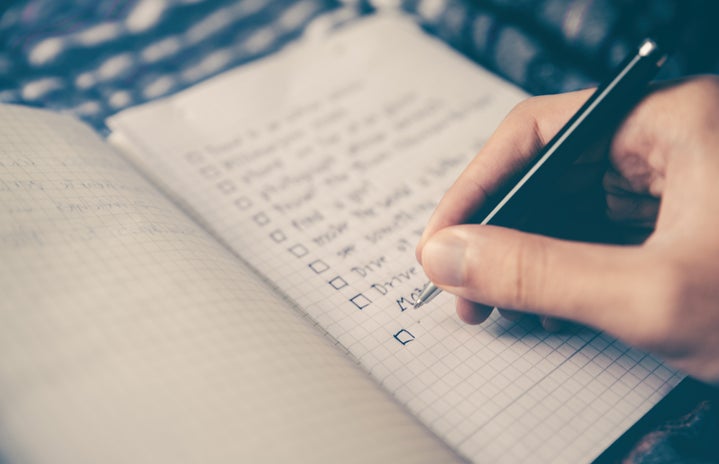January brings about an outpouring of resolutions, goals and bucket list additions. It’s easy to get swept up in quick fixes and five-step programs. We urge you to ditch these in favor of a steady, grounding new habit: journaling. Journaling improves your mental well-being, allows you to slow down and helps you reflect on your values. It can seem like an overwhelming task at first, so we took some time to break down the different types of journaling. Check out the list to see what suits you best!
- Freeform writing
-
Barbara: Journaling for many people, including myself, is an outlet for my thoughts and emotions. I take my journal every night and let out any and every thought that has been following me throughout the day, not giving me a second of rest. When I journal, I escape from others’ commentary, I block out all other distractions and I am left with just my thoughts. Journaling allows me to reflect on my surface-level ideas and feelings, dig into the reasons behind them and find a type of closure. It even allows me to discover some subconscious thoughts and feelings that I wasn’t fully aware I was harboring. After a couple of freeform journaling, I quickly realized that I have a tendency to journal around my negative thoughts and emotions, trapping me in a never-ending spiral of pessimism. Can any of you relate to that? I made it my goal to also journal my positive thoughts and emotions or find a positive thought to express within succumbing to this spiral of negativity. This altered how I view journaling and how it made me feel …
Ava: I love the idea of journaling; the way you describe it makes me want to pick up a pen and paper right now to let my thoughts out. Unfortunately, I’ve found that journaling is hard for me to keep up with. I get “divine inspiration” for a little while, but then I inevitably get bored and unmotivated. The blank page becomes less of a freeing platform and more of a daunting task. I think part of this relates to the negative thought spiral you mentioned. I often write about the stressors in my life, which makes me feel like a broken record. Maybe if I knew how to combat this or had slightly more guidance, I’d be more inclined to make freeform journaling a habit.
- Gratitude journaling
-
Ava: I started a gratitude journal in January 2022 as a New Year’s Resolution. I write three things I’m grateful for every night before I go to bed. For instance, on July 18 I wrote that I’m grateful for “a pretty and calm hike, bagel sandwiches, and time with cousins.” There are days where the most I can muster is that I’m thankful for fine weather and therapy. But there’s always something. Some days I’m tempted to write more, but I hold myself back; focusing on three simple things forces me to think critically about what I value. I tend to dwell on imperfect moments: an awkward interaction; a not-so-great grade or a nagging headache. Writing about what I’m grateful for expands my viewpoint. I think beyond my moment-to-moment struggles and more about everything I’m blessed with.
Barbara: I think that is a very interesting approach to journaling if you are one to either go down that negative spiral or one to just rant on for a couple of pages. In this way, one avoids being repetitive and non-productive with their journaling. It also benefits journalists, like me, by offering a positive viewpoint on their troubles. It allows writers when looking back to remember everything they are grateful for in times of struggle and despair.
- Goal-oriented journaling
-
Barbara: Another approach to journaling I recently started implementing is goal-oriented journaling, namely having a specific goal in mind that guides you while journaling. Oftentimes in order to make your thoughts and emotions more into a cohesive sequence it is important to have a goal in mind you are aiming towards. These goals can vary greatly depending on your needs at the moment. For example, it can be goals directed at an internal conflict such as “I am too sensitive” or at an external conflict such as “the big fight I just had with my mom” or at more practical struggles such as “how to become more organized.” This form of journaling is more fulfilling and empowering as it clearly shows my progress and accomplishments on my various thoughts and emotions.
Ava: I love this! I incorporate this style of journaling into my weekly planner. At the start of each week, I write down a couple of simple goals that will help me grow into a happier, more productive and more balanced version of myself. Last week, I wrote that I wanted to do yoga three times because it helps me feel more grounded and reduces my anxiety. I then looked at my planner and found practical ways I could meet this goal. If I meet my goal and find that it serves me well, I continue to prioritize it in the future. If I didn’t benefit from it, I let it go.
- Video journaling
-
Ava: As I mentioned before, freeform journaling was never sustainable for me. I found myself writing multiple paragraphs every night for a week, getting bored and falling out of habit, and then starting the cycle again in a month. I turned to video journaling, and I haven’t gone back. A couple of times a week, I set up my phone camera, press record and talk. I feel more satisfied and at ease when I talk instead of writing. As a perfectionist with a strong urge to write with impeccable parallelism and metaphor use, a video journal releases me from control. I just let go of my thoughts and move on. The videos are compiled in a “Video Journals” album in my camera roll. I enjoy looking back on old videos; it’s comforting to know that what was bugging me then is resolved or unimportant just a few weeks later.
Barbara: I had never thought of video journaling; I guess I am more of a traditional journalist. I am very intrigued by the concept though and compelled to try it out. Video journaling seems multifaceted. It takes journaling to a whole new level. It allows you to communicate your thoughts and emotions not only through your writing but through your voice, hand gestures, body language and facial expressions. Unlike society with its commentary and criticism restricting your expression, video journaling is limitless. In this way, video journaling can be perceived as freeing and therapeutic — a way of releasing your internal self using authentic means. As you mentioned, Ava, looking back on these multidimensional videos allows you to truly reflect on your past thoughts and emotions and how they perhaps have changed with time.



